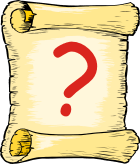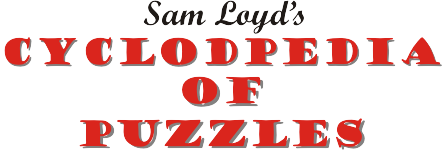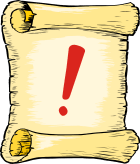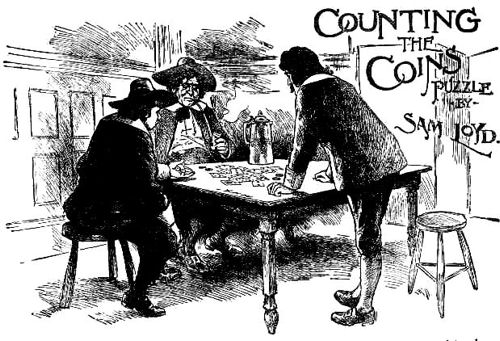



I HAVE ALWAYS found the young folks to be particularly clever at all manner of tricks with coins, so here is one which will please them, and at the same time make them more familiar with our United States money.
Three Milwaukee Dutchmen played pinochle for two days without stopping, and when they adjourned it was found that Claus had won just 8 cents and his brother Karl 22 cents. The problem which I want the young folks to find out is to prove just how much money the other fellow, Heindricks, had when the play ended, for, as you see in the picture, each has just two coins, and those six coins, which are worth a total of just $3, represent all the money belonging to the party, it is to be assumed that the money that they now have is all that they had when they started the play, so that the score for beer and pipe, which must be settled for, does not pertain to the problem.
Heindricks had a 25-cent piece and a dime, Claus had a $2.50 gold piece and a 2-cent piece, Karl had a dime and a 3-cent piece, and at the end of the play Heindricks had the 3 and 2-cent pieces, which would show a loss of 30 cents; Claus had the $2.50 gold piece and one dime, which show a profit of 8 cents, while Karl has the 25-cent piece and one dime, which shows a profit of 22 cents.
2. How They Made Love in Puzzledom.
Here is a little story told in verse which should greatly interest our sweet young women puzzlists:
He dwelt in Massachusetts,
An she in Muscatine;
And they liked the “Puzzle Corner”
Of the Hogwash Magazine.
She could reverse, eviscerate,
And syncopate a word,
Add two-fifths of a famous man
And find a common bird,
And the thing whose 8, 4, 1
Was a flower, and 6, 7, 2,
11, 9, 6, 3, 14, 4
An antique city knew.
She used to send solutions in
And signed them “Dimple Dew,”
While he successful answers gave
As “Montfort Montague.”
Cupid o’er Massachusetts flew,
And over Muscatine,
And fed the flame that gradual grew
With the Hogwash Magazine.
Until one day the editor
Offered a handsome prize
For those who 'tween his 2d and 1st.
His third could recognize.
“Dimple Dew” and “Montague”
The sole replies sent in;
She got an oroide pen handle,
He an Alaska pin.
Their names upon the “Roll of Fame”
Were printed side by side;
He from the editor got, her name
And he claimed her for his bride.
“Oh, be my first,” he wrote, “and I
‘My second’ and my third,
And my sixteenth, and finally
Henceforth shall deem absurd.”
And she wrote by return of post:
“Decapitate a glove,
Prefix an orb and add a sheep
And let that tell my love.”
He packed his carpet 2, 1, 7,
And went to Muscatine,
They wedded there and took a file
Of the Hogwash Magazine.
And spent a rapturous honeymoon
As blythe as joyous birds,
And found their second was their first
And 8, 6, 3 and 4 was thirst
And syncopating words.
3.
Why is a buckwheat-cake like a caterpillar? Because it is a kind of grub that it makes the butter-fly.
What is that which has neither flesh nor bone, yet has four fingers and a thumb? A glove.
Barnum drove a ten-in-hand through New York city, and his horses had only twenty-four feet among them. How was that? They had twenty fore feet.
When is the sun a mechanic? When it is a Mason (May sun).
Of what trade are all the Presidents of the United States? Cabinet-makers.
[Page 90]